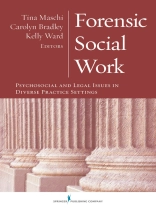‘[T]his book provides practical practice guidance as well as…interviewing and assessment tips….[A]n invaluable source of information for students, practitioners, researchers and educators.’
– Karen M. Sowers, Ph D
Dean, University of Tennessee
College of Social Work
Regardless of their field of practice, all social workers must understand how legal issues impact the financial, psychological, emotional, and social concerns that their clients face. Yet legal issues are rarely integrated in social work education in a meaningful and practical way. Therefore, it is imperative that social workers gain the interdisciplinary knowledge of the laws and policies that affect their client populations.
This groundbreaking text broadens the traditional definition of forensic social work to include the legal issues encountered in all social work settings-family and social services, education, child welfare, mental health, addiction treatment, juvenile and criminal systems, and immigration services. Advocating a collaborative approach, this book will allow social workers to navigate the complex social and legal issues that affect their clients.
Includes discussions of the common legal issues all social workers face:
- How to help meet basic client needs such as income, food, and shelter
- Policies and practice with victims of violence
- The relationship between school social work and the law
- Assessment and treatment of child abuse and neglect
- The legal needs of clients with mental health and addiction issues
- Forensic practice in juvenile and criminal justice systems
- Effective practice with immigrants, refugees, and victims of human trafficking
Digital instructor’s materials available upon request. Email [email protected] to gain immediate access to:
- Forensic Interviewing Best Practices sample
- Psychiatric Evaluation sample
- Rapid Psychosocial Assessment Checklist
- Sample Syllabus for Forensic Social Work Courses
- Strengths-based Psychosocial Assessment and Treatment Planning Outline
Daftar Isi
‘
PART 1: OVERVIEW OF COLLABORATIVE FORENSIC PRACTICE
Chapter 1: Defining Collaborative Forensic Social Work with Diverse Populations
Tina Maschi and Mary Lou Killian
Chapter 2: A History of Forensic Social Work in the United States
Mary Lou Killian and Tina Maschi
Chapter 3: Visualizing Forensic Social Work and Collaborative Practice: A Social Justice Systems Approach
Tina Maschi and Mary Lou Killian
Chapter 4: Understanding Civil and Criminal Law
Christine Heer
Chapter 5: From Intervention Roles to Multidisciplinary Practice
Laura Kelly, Nora Smith, Sandy Gibson
PART 2: FORENSIC PRACTICE IN FAMILY AND SOCIAL SERIVCES
Chapter 6: Family: Youth & Adults
Nancy Mezey and Rebecca Sanford
Chapter 7: Social Services: Meeting Basic Human Needs of Income, Food and Shelter
Ann Sparks
Chapter 8: Special Topic: Assisting Female Victims of Intimate Partner Violence: The Role of Victim Advocates
Marie Mele
Chapter 9: Special Topic: Forensic Practice with Older Adults Victims of Abuse
Janet Mahoney and Morris Saldov
PART 3: FORENSIC PRACTICE IN EDUCATION
Chapter 10: Social Work, Education, and the Law
Carolyn Bradley, Rosemary Richards, Jean Doyle
Chapter 11: Special Topic: Building Bridges: School Reentry of Incarcerated Juveniles
Lauri Goldkind and Paul Hirschfield
PART 4: FORENSIC PRACTICE IN CHILD WELFARE
Chapter 12: Child Welfare
Nora Smith
Chapter 13: Special Topic: Forensic Interviewing for Child Sexual Abuse
Kenneth Lau and Eileen Treacy
PART 5: FORENSIC PRACTICE IN MENTAL HEALTH AND SUBSTANCE ABUSE
Chapter 14: Mental Health and Addictions Settings: Legal and Ethical Issues for Practice
Carolyn Bradley and Kelly Ward
Chapter 15: Special Topic: ‘Order in the Drug Court’: Understanding the Intersection of Substance Abuse and Law
Keith Morgen, Lauren Gunneson, and Lisa Maietta
Chapter 16: Special Topic: Women at Risk: Legal Involvement Among Mothers in Addiction Treatment
Nancy M. Violette, Thomas J. Morgan, & Audrey Redding-Raines
Chapter 17: Special Topic: Suicide Prevention Programming in the Jail Setting
Schnavia Smith Hatcher
PART SIX: FORENSIC PRACTICE IN JUVENILE AND CRIMINAL JUSTICE
Chapter 18: Juvenile Justice and Social Work
Tina Maschi, Nancy Violette, Jennifer Ristow, Nancy Scotto Rosato
Chapter 19: Criminal Justice: Prisons As a Practice Setting
Rebecca Sanford and Johana Foster
Chapter 20: Criminal Justice: Reentry in the Twenty-first Century
Patricia O’Brien
Chapter 21: Special Topic: Disproportionate Involvement of Minority Youth
Leon Banks, Schnavia Smith Hatcher, Ed Risler
Chapter 22: Special Topic: Restorative Justice: What Social Workers Need to Know
Katherine van Wormer
PART 7: DIVERSITY, HUMAN RIGHTS, & IMMIGRATION
Chapter 23: Human Rights: Implications for Forensic Social Work
Rosemary Barbera
Chapter 24: Calling Some ”Illegal:” Practice Considerations in Work With Undocumented Immigrants
Carol Cleaveland
Chapter 25: Collaborative Forensic Social Work with Refugees
Mary Kay Jou and Leah Lazzaro
Chapter 26: Human Rights Issues and Research with Prisoners and Other Vulnerable Populations: Where Does Evidence-Based Practices Go From Here?
Sandy Gibson
APPENDICES
Appendix A: Author Biographies
Appendix B: Strengths-Based Psychosocial Assessment (Child Welfare & Community Populations and Settings) Example
Appendix C: Rapid Psychosocial Assessment (Juvenile and Criminal Justice Populations and Settings) Example
Appendix D: Psychiatric Evaluation Example (Juvenile and Criminal Justice Populations and Settings)
Appendix E: Forensic Interviewing Best Practices Example
Appendix F: Multi-Disciplinary Example: NJ Anti-Trafficking Coalition
INDEX’
Tentang Penulis
Kelly Ward, Ph D, LCSW, LCADC is an Associate Professor at Monmouth University in West Long Branch, NJ and is also a private practitioner working with adolescents with substance abuse issues.












